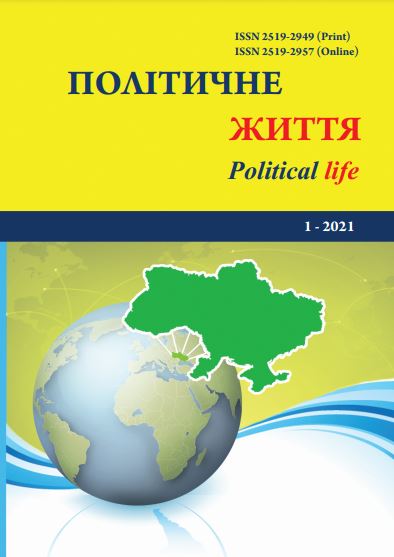The Process of Ukraine's Integration into the European Union in the Context of the Contradictions of Internal European Development
DOI:
https://doi.org/10.31558/2519-2949.2021.1.15Keywords:
integration of Ukraine; European Union; intra-European development; European integration process; geopolitical conditions of Ukraine's European integrationAbstract
The article examines the process of Ukraine 's integration into the European Union. In particular, externally conditioned factors influencing the efficiency of the European integration process are substantiated. The main ones are geopolitical conditions, strategic principles and internal European contradictions that may threaten the development of Ukraine. The scientific approaches to the study of European integration processes are systematized, the geopolitical conditions of Ukraine’s European integration are clarified and the influence of the contradictions of internal European development on the process of Ukraine’s European integration is revealed. Among the strategic principles of the integration process is the external dimension, which means the establishment of close political and economic connections with the EU. The further development of relations between Ukraine and the EU is determined by the signing of the Association Agreement and its ratification by the Verkhovna Rada of Ukraine and the European Parliament, as well as the implementation of these requirements by Ukraine.
Contradictions of intra-European development have been identified, which may pose a potential threat and create additional risks for the process of Ukraine's integration. These include criticism from some EU member states of Ukraine's ability to systematically reform its political and economic systems to reach European standards; existing problems in the EU regarding the final integration of countries that have gained membership in the XXI century. and the weakened consolidation capacity of member states in EU domestic policy.
It is concluded that the intensity and effectiveness of the European integration process in Ukraine depends largely on subjective factors, namely the position of the relevant political leader.
References
Байков А. А. «Мягкая мощь» Европейского Союза в глобальном силовом равновесии: евро-российский трек. Вестник МГИМО-Университета. 2018. № 2. С. 36–46.
Заремба О. В. Геополітичні ідеї та гіпотези в українській політичній думці ХХ – початку ХХІ століття. / Заремба О. В., Федоренко О. А. К. : «Золотые ворота», 2019. 209 с.
Лях М. Роль внутрішніх і зовнішніх чинників у процесі європейської інтеграції Польщі: уроки для України. Науковий блоґ НаУ «Острозька Академія». 24.05.2012. URL: http://naub.oa.edu.ua/2012/rolvnutrishnih-i-zovnishnih-chynnykiv-u-protsesi-jevropejskoji-intehratsiji-polschi-uroky-dlya-ukrajiny/
Нагорна Л. П. Соціокультурна ідентичність: пастки ціннісних розмежувань. К. : ІПіЕНД ім. І. Ф. Кураса НАН України, 2011. 272 с.
Report for Selected Countries and Subjects Official website of The International Monetary Fund. URL : http://www.imf.org
Расширение ЕС на Восток: предпосылки, проблемы, последствия / [Под ред. Арбатовой Н. К., Гутника В. П., Хесина С. Е., Юданова Ю. И.]. М. : Наука, 2003. 344 с.
Східне партнерство Урядовий портал. URL: http://www.kmu.gov.ua/control/uk/publish/article%3Fart_id=224168250&cat_id=223345569
Тиркус Ю. С. Особливості стратегії інтеграції України до Європейського Союзу. Політологічні записки : зб. наук. пр. / [голов. ред. Г.П. Щедрова]. Луганськ : Вид-во СНУ ім. В. Даля, 2014. Вип. 1 (9). С. 319–327.

